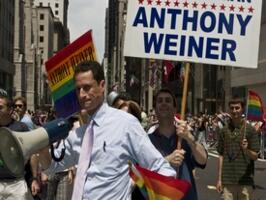Americans Say Manchester-like Attack Likely in U.S.
Most Americans think it’s likely a terrorist attack comparable to the Manchester bombing will happen in the United States, but they're not afraid to attend big events.

Most Americans think it’s likely a terrorist attack comparable to the Manchester bombing will happen in the United States, but they're not afraid to attend big events.

Chelsea Manning, the former Army intelligence analyst sentenced to 35 years in prison for releasing classified government documents to the website WikiLeaks, was released from prison earlier this month after President Obama commuted her sentence as one of his final presidential actions. But few voters view Manning favorably and most disagree with Obama’s parting decision.

President Trump and his family met with Pope Francis in the Vatican earlier this week, and while the meeting was met with mixed emotions, voters still generally believe the United States has a friend in the pope.

The radical Islamic State group (ISIS) has proudly taken credit for the slaughter of innocents earlier this week at a concert in Manchester, England, and voters here strongly agree with President Trump that ISIS needs to be totally wiped out.

Most voters still feel President Trump is to blame for his bad relationship with the media but also don't think there is anything he can do about it.

President Trump is heading to Brussels today for the NATO summit, and support for the organization is up as voters continue to see a need for the alliance more than 60 years after it was formed.

President Trump has visited both Saudi Arabia and Israel as part of his first foreign trip as President of the United States this week. But voters believe this country’s relationship with Israel is more important to stability in the Middle East than the relationship with Saudi Arabia is.

President Trump traveled to Saudi Arabia this week to reinvigorate the U.S.-Saudi alliance, but voters still think there’s a long way to go.

Former Democratic Congressman Anthony Weiner has pleaded guilty to texting sexually explicit material to an underage girl, and voters strongly believe he should be put in prison for it.

President Trump's recent decision to fire FBI Director James Comey sparked a media firestorm, but voters are divided as to whether questions about the move are genuine or political in nature.

President Trump campaigned on the promise to "Make America Great Again" but U.S. voters tend to think he's more concerned with what's best for himself rather than the country. Voters are more likely to say his predecessor put the country first.

Most voters believe President Trump tried to shut down the probe of any connections between his associates and the Russians but are confident the FBI will thoroughly investigate the matter despite the firing of Director James Comey.

On behalf of Rasmussen Reports, I’d like to extend a warm welcome to all the attendees at this week’s annual public opinion research conference in New Orleans. This year’s conference theme, Embracing Change and Diversity in Public Opinion and Social Science Research, signals a new opinion research industry willingness “to welcome both the challenges and opportunities presented by a rapidly changing public opinion and research methodology landscape and an increasingly diverse population.”

In the wake of the international WannaCry cyberattack, voters say cyberattacks from other countries do greater economic damage than military attacks do and believe more strongly than ever that such attacks should be seen as an act of war.

Voters are even more worried about the safety of America’s computer network during the ongoing international WannaCry cyberattack, but most recognize, too, that attacks of this nature can’t be totally avoided.

Voters aren’t overly impressed with James Comey’s performance as FBI director, but just over half disagree with President Trump’s decision to fire him.

As tensions rise with North Korea and Russia, Americans suspect a nuclear war is coming, but they’re also more confident than they have been in years that the United States will still be the world’s dominant power at the end of the century.

Support for a single-payer health care system reached a new high despite voters’ views that it will increase health care costs and hurt the quality of care.

President Donald Trump this week signed an executive order that seeks to overturn the Johnson Amendment barring tax-exempt organizations like churches from participating in politics or political campaigns. Many worry this blurs the line between church and state, but most voters feel churches and other similar organizations should have a proverbial seat at the political table.

Voters tend to believe it’s the government job to make sure Americans have health care, even though they doubt the government will do it fairly and question whether taxpayers can afford it.